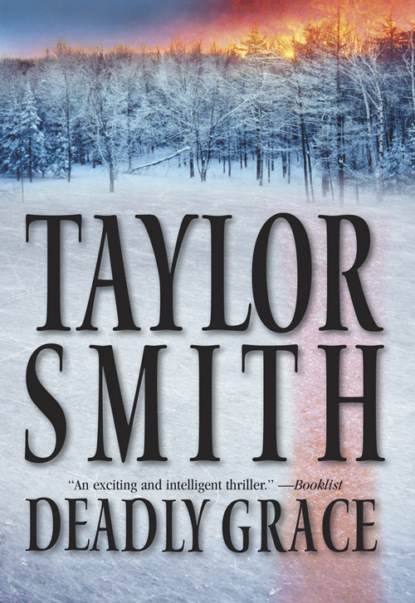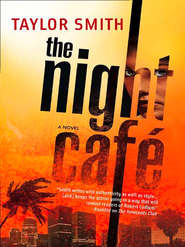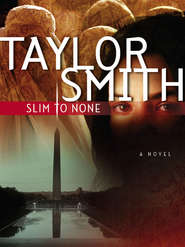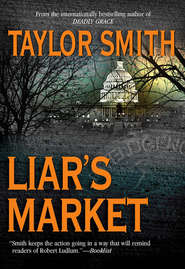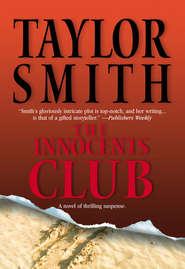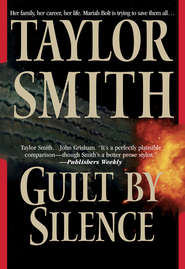По всем вопросам обращайтесь на: info@litportal.ru
(©) 2003-2024.
✖
Deadly Grace
Автор
Год написания книги
2018
Настройки чтения
Размер шрифта
Высота строк
Поля
The sour odor of soot was already insinuating its way in through the car’s air vents. Cruz climbed out of the cruiser, moving off to the side, out of the direct path of the sunlight to get a better view of the burned-out shell. He cupped a hand over his eyes, squinting against the sun that was beginning to sink toward the western horizon, setting up a blinding glare of ice and snow on Lost Arrow Lake. From this vantage point, he could see little except the uneven silhouette of what remained of the Meade home.
The scene looked as the fire had rendered it, for the most part, bordered and contained by a band of yellow plastic crime scene tape. The house had mostly collapsed in on itself. All that remained standing were the sooty red bricks of a large hearth and chimney, rising like a sentinel above the cracked and blackened cement foundation. A few charred timbers lay tipped at odd angles, crusted over with a thick layer of ice from the soaking of the fire hoses.
The yard sloped down to a wooden dock that extended out to the frozen lake. On the opposite shore, a few snow-capped cottages and a dense line of pine trees stood in stark relief against the brilliant sky. The view was impressive, Cruz thought, like a Currier and Ives Christmas fantasy. In summer, the place would no doubt be a water sport paradise. Right now, he could make out the tracks of dozens of skis and snowmobiles crisscrossing the lake’s frozen surface. Out in the middle of it, narrow gray plumes rose from makeshift chimneys poking through the roofs of small plywood huts, evidence of heartier souls than he sport fishing through the thick ice.
The cruiser rocked as Berglund climbed out on his side and slammed the door. His green nylon police parka was unzipped, despite the frigid temperature, and the brass buttons of his khaki uniform strained across his chest as he came around the car to join Cruz. Like many very large men, Berglund moved slowly and with great precision, as if worried about accidentally bowling someone over.
Two men wearing orange coveralls over their clothing were poking around the site, taking measurements by the look of it. A couple of local cops in uniforms like Berglund’s stood just outside the tape, watching them work and standing guard over a large, articulated metal toolbox and what looked to be a pile of plastic and paper evidence bags.
“Pretty bad,” Cruz observed, as they watched the men working over the grim scene.
“Pretty bad,” the deputy agreed—both of them masters at understatement.
A silence settled over them, a quiet more profound than any Cruz could remember for a very long time. There were no automobile noises, no commuter planes, no traffic helicopters droning overhead. No hum of the heavy machinery that is a city’s living, beating heart. He might have expected a few chirping birds, at least, but any that were wintering here had obviously had the sense to flee this place of death.
Cruz would have welcomed the opportunity to fly away himself. His stomach turned at the acrid odor of wet, charred wood and the toxic stench of melted plastic, rubber and paint.
He took a step forward and heard a brittle crunching sound under his shoe. He looked down to see that he was standing on broken shards of glass, maybe a piece of shattered window pane. He kicked it aside, then stopped to pick out a small fragment that had become wedged into the hard rubber of his left heel.
“Winds were high the night of the fire,” Berglund said. “Flames jumped from treetop to treetop, and it looked like they might cross the lot line. We were worried we’d lose half the street.”
Cruz followed the direction of the burly man’s cocked thumb to the white birch and silver maples standing between the destroyed house and the property to the north of it. Several were scorched and fire-capped. On the neighbor’s garage, maybe sixty feet away, the wood siding was visibly blistered and peeling in a couple of spots, mute testimony to the intensity of the blaze.
“We’ve only got two pumper trucks,” Berglund said. His deep voice doled out words sparingly, Cruz noted, like someone unaccustomed to strangers or long explanations. “It’s just a volunteer force, and fighting the wind like we were…” The frown deepened on his square face and his white-blond eyebrows were almost linked now by the two vertical creases above his nose. “If it hadn’t been for the wind, we might have been able to get it under control, save more evidence. Once we realized there was no way of saving the house or pulling Mrs. Meade out, though, we made the decision to save the neighbor’s place.”
He said it defensively, Cruz noted, like he thought this D.C. hotshot might be getting ready to ream out the locals for their ineptitude. “Makes sense,” he agreed.
A cold wind blew up off the lake and Cruz felt the damp cut through him. He turned up the collar of his overcoat, wishing once again that he’d worn something warmer. Back in D.C., they were just weeks away from cherry blossom time, when the air would turn humid and ripe, but that kind of weather was a long way off here. There was no point in looking for warmth in these ice-crusted coals, either.
Suddenly, he recoiled, picking up a trace scent through the pervasive stink of charred wood, a smell that was both familiar and unforgettable—the terrifying odor of roasted human flesh. It was just his imagination messing with his head, he tried to tell himself. Grace Meade’s charred body had long since been removed.
Logic carried no weight, however, because what he was seeing in his mind’s eye was not this scene, but another fire long ago—another murder victim’s body torched in a deliberate bid to destroy evidence, only this victim hadn’t been a stranger, and Cruz hadn’t been some impartial investigator arriving after the fact.
“You want to take a closer look?” Berglund asked, stepping up to the ribbon of yellow plastic crime scene tape that circumnavigated the lot. He reached out and lifted it, holding it up for Cruz to pass under. All the professional courtesies.
God almighty, no, he didn’t want to get any closer, Cruz thought, revulsion springing from the deepest recesses of his brain, that primitive part that deals in instinctive fear and the impulse to flee. He managed to hold his ground—just.
“I can see all I need to from here,” he said. “I’ll just wait till those guys get done. I don’t want to be trampling over evidence.”
He turned his back to the site, looking up and down the road as if recreating in his mind the scenario as it had played out two nights earlier. All along the curving lakefront road, well-tended houses with two-car garages nestled into wooded lots that flowed, unfenced and unbroken, from one into the other. They were a custom-built mix of ranch-style bunga lows, Cape Cod salt boxes and sprawling split-levels with sand-colored prairie limestone facades. The lots were large, none smaller than a half acre, Cruz estimated, space beyond the reach of all but the wealthiest of urban dwellers. Even in a small town, this had to be prime real estate. Cruz saw snowmobiles parked in several of the driveways, and a couple of tarp-covered powerboats jacked up on trailers for the winter.
When his heartbeat had finally slowed to a normal pace, he allowed himself to turn back toward the destroyed house, where the two jumpsuited investigators seemed to be finishing their work. They picked their way across the rubble, stopping to lay down a few evidence bags in the tool case. One of the men was carrying a long-handled spade, and he jammed it upright in a pile of ash. Clapping the dust off their hands, they ducked under the tape and walked over to where Cruz and Berglund were standing. One was gray-haired, balding, but fit-looking under his orange jumpsuit. The other was younger, heavyset and perspiring, despite the cold, so that his black-framed glasses kept slipping down the slick incline of his nose, which was black from the repetition of his sooty hand pushing them back.
“This is Agent Cruz from the FBI,” Berglund told them.
They nodded, and the older of the two men held out a dirty hand. He then thought better of it and transformed the shake to a quick wave. “I don’t think you want to touch this hand,” he said. “I’m Don Beadle from the State Bureau of Investigation. This is Bill Oppenhalt from the Arson Investigation Unit. I guess it was you who originated the request for us to come out here and take a look, Agent Cruz?”
Cruz nodded. “That’s right. Appreciate the cooperation.”
“No problem. That’s why we’re here.”
“So, how does it look? Do you think this was deliberately set?”
Beadle deferred to Oppenhalt, who pushed his heavy glasses up his nose once more and nodded. “Oh, yeah, not much question of that, I’d say. Things were a little stirred around before we got here, mind you, but we were able to spot a fair number of physical indicators just the same.”
“Like what?” Berglund asked.
“Well, you got your multiple high burn points and several localized heavy burn patterns indicating that there was more than one point of origin. Some spalling in the concrete foundation, too, which some would say indicates an accelerant, although it’s not a real reliable indicator, in my experience. We took some carpet and underpad samples, though, and those were a little more conclusive. I’ll want to run them through a gas chromatograph back at the lab just to be sure, but in the end,” he said, tapping the side of his blackened nose before pushing his glasses up yet again, “the nose knows.”
“What do you mean?”
Oppenhalt grunted as he bent to scoop a sample of dirt, which he rubbed between his fingers, then held under his nostrils. “Gasoline,” he said. “On a cold day like this, it’s real easy to pick it up. You guys don’t smell it? It’s all over the place here.”
Berglund shook his head. “I can’t smell anything except charcoal, and that’s been stuck in my nostrils since the night of the fire. And anyway,” he added, nodding to the gravel driveway beneath their feet, “what you’re smelling here is probably several years worth of dripping oil from all the cars that have been parked in this drive.”
“Well, sure, but it’s not just in the drive, Deputy,” Beadle said, cocking his thumb back over his shoulder. “It’s all over the scene. Really strong in the carpet samples we found, like Bill here said. Even I picked it up, and my nose isn’t nearly as well trained as his is.”
The broad shoulders of Berglund’s green parka hefted, sending a shower of what looked at first glance to be dandruff flying to the ground, until Cruz realized it was actually a fine layer of ash that was still settling almost forty-eight hours after the blaze.
“You guys happen to come across any spent cartridges or slugs while you were sifting through the ash?” Cruz asked. “Deputy Berglund says the autopsy on the lady who died here indicates she may have taken a shot to the chest from a fairly large-caliber weapon, like maybe a forty-five or a nine millimeter.”
Beadle shook his head. “No, we were on the lookout for it, but nothing showed up. If your killer was the careful sort, he might have picked up his spent cartridges before he left the scene.”
“That would make him one very careful drug-crazed hippie drifter looking for a quick score,” Cruz said dryly, glancing at Berglund.
“I never said that was the only explanation for what went down here,” the deputy said irritably. “That was the chief’s thought, and it’s as good as any other at the moment. On the other hand, somebody that calculating…” His voice drifted off.
Berglund’s face was drawn and showing signs of weariness and strain. It was obvious he was also ticked off at being second-guessed by meddling strangers. Fair enough, Cruz thought. If it was him in the deputy’s place and some stranger had dropped into the middle of one if his cases, pulling rank and calling in outside investigators, he’d probably be just as pissed. But that didn’t change the fact that, frankly, the guy needed the help.
“You seen all you need to here?” Berglund asked.
Cruz glanced back at the rubble and nodded. “I guess I have. You guys?”
Beadle also nodded. “We’ll get our preliminary report out to you both within a couple of days. Final has to wait for the chemical tests on the samples we took, but like Bill said, our view is that you’ve definitely got an arson case on your hands here, guys, so you’ll want to bear that in mind as your investigation proceeds. Anything else you need from us?”
“Not for now. I’ll let you know if I do,” Berglund said glumly.
CHAPTER 7
That doctor stopped by to see me again—a couple of hours ago, I think. I wasn’t quite as doped up as I’ve been the last few times she was in. (And how many times is that, I wonder? I have no idea.) But it’s quiet now. No one has been in for quite a while. They seem to have decided to leave me with nothing but this notebook for company. That’s fine with me. I just want to be left alone.
I hear the murmur of voices out in the hall, sounding low and disapproving as they pause occasionally at the window of this room. They consider me stark raving mad, I suppose, and dangerous to boot.
The doctor never actually came out and said so, but I suspect she’s a psychiatrist. It makes sense, after what I tried to do in the ER—after everything else, too. Maybe she really does want to help. But it’s more likely, I think, that this is part of the process they’re going through now—determining my competency before they decide what to do with me. I’m beyond help, in any case. Though I’m sure I will be judged, it won’t be in this lifetime.
I never even looked at the doctor, although she did her best to engage me in conversation. She’s good, too. Pulled out all the tricks—open-ended questions. Empathy. Those long, pregnant silences that normal people feel obliged to fill with nervous chatter. She seemed disappointed when I didn’t respond.
“Perhaps you’ll feel like talking tomorrow, Jillian,” she said just before she left.





